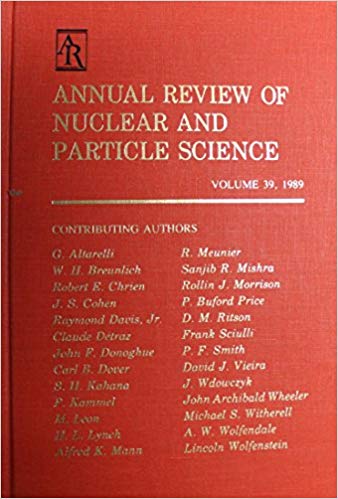Experimental Considerations in Long-Baseline Neutrino Oscillation Measurements
IF 9.1
2区 物理与天体物理
Q1 PHYSICS, NUCLEAR
Annual Review of Nuclear and Particle Science
Pub Date : 2023-06-27
DOI:10.1146/annurev-nucl-102020-101615
引用次数: 1
Abstract
Long-baseline neutrino oscillation experiments, which are among the largest neutrino experiments in the world, have extensive physics programs to make precision measurements of three-flavor oscillation parameters, search for physics beyond the Standard Model, and study neutrinos from astrophysical sources. In this article, experimental considerations, including oscillation phenomenology, detector and experiment design, and analysis strategies, are described, with a focus on the three-flavor oscillation measurements. Current and future experiments are discussed, and significant sources of systematic uncertainty, along with mitigation strategies, are emphasized as control of systematic uncertainty is critical for success in precise measurement of long-baseline oscillation parameters. This article is structured as a primer for those new to this area of experimental work. Expected final online publication date for the Annual Review of Nuclear and Particle Science, Volume 73 is September 2023. Please see http://www.annualreviews.org/page/journal/pubdates for revised estimates.长基线中微子振荡测量中的实验考虑
长基线中微子振荡实验是世界上最大的中微子实验之一,它有广泛的物理程序来精确测量三种振荡参数,搜索标准模型之外的物理,并研究来自天体物理源的中微子。本文介绍了实验考虑因素,包括振荡现象学、检测器和实验设计以及分析策略,重点介绍了三种风味振荡测量。讨论了当前和未来的实验,并强调了系统不确定性的重要来源以及缓解策略,因为控制系统不确定性对于成功精确测量长基线振荡参数至关重要。这篇文章的结构是为那些新进入这一领域的实验工作的人准备的。《核与粒子科学年度评论》第73卷预计最终在线出版日期为2023年9月。请参阅http://www.annualreviews.org/page/journal/pubdates用于修订估算。
本文章由计算机程序翻译,如有差异,请以英文原文为准。
求助全文
约1分钟内获得全文
求助全文
来源期刊
CiteScore
21.50
自引率
0.80%
发文量
18
期刊介绍:
The Annual Review of Nuclear and Particle Science is a publication that has been available since 1952. It focuses on various aspects of nuclear and particle science, including both theoretical and experimental developments. The journal covers topics such as nuclear structure, heavy ion interactions, oscillations observed in solar and atmospheric neutrinos, the physics of heavy quarks, the impact of particle and nuclear physics on astroparticle physics, and recent advancements in accelerator design and instrumentation.
One significant recent change in the journal is the conversion of its current volume from gated to open access. This conversion was made possible through Annual Reviews' Subscribe to Open program. As a result, all articles published in the current volume are now freely available to the public under a CC BY license. This change allows for greater accessibility and dissemination of research in the field of nuclear and particle science.

 求助内容:
求助内容: 应助结果提醒方式:
应助结果提醒方式:


